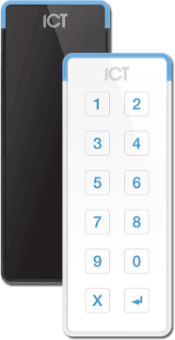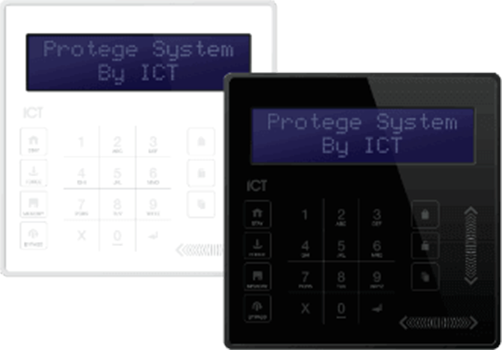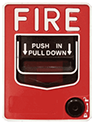Video MGMT System
 Access Control
Access Control
Voice & Data Wiring
 Burglar Alarm
Burglar Alarm
 Fire Alarm
Fire Alarm
Video MGMT System
Voice & Data Wiring
THOUGHT CENTER > Blog > Security Cameras
January 24, 2024
Mammoth Brief
Too busy to read? Here’s a summary:
If you're on the hunt for the best security cameras for your business, you've hit the jackpot. At Mammoth Security, we know a thing or two about keeping businesses safe and sound.
In a world in which businesses are four times as likely to be targeted by criminals as home properties, commercial-grade surveillance systems are a necessary investment.
Without further ado, let's explore the best camera types for modern commercial-grade security, as well as advanced camera features suitable for specific settings and applications.
AI features are often brand-based, but at Mammoth Security, all of our camera systems have person and vehicle detection, which dramatically reduces footage retrieval time. The best security cameras for business are turret cameras, bullet cameras, and multi-sensor cameras.
Turret cameras have a ball-and-socket design that allows for easy adjustment of the camera's field of view without repositioning the entire camera.
Turrets are the most versatile camera type and the type we recommend the most. They’re ideal for retail stores, small offices, and restaurants where discreet monitoring is essential. Most are also suitable for outdoor installation.
Bullet cameras are best used in scenarios where long-range viewing is required, such as monitoring the perimeters of warehouses, large commercial complexes, and parking areas, as well as entry and exit points in high-security zones. Many models are leveraged for long-distance viewing, whereas others make great overview cameras.
Bullet cameras are characterized by their cylindrical shape, resembling a bullet shell. They’re highly visible, which acts as a deterrent to potential intruders, thieves, vandals, and other bad actors.
Multi-sensor cameras consist of four or more camera lenses (with their own image sensors) housed in a single unit. Each lens can be positioned independently, allowing for a customizable and comprehensive coverage area, including panoramic views. These cameras often support high-resolution recording and may include advanced features like video analytics.
Multi-sensor cameras are ideal for covering large areas with a single device, reducing the number of cameras needed for complete coverage.
These cameras are particularly useful in places where wide-area surveillance is crucial, such as shopping malls, large open office spaces, and public squares. They’re also valuable in logistics centers and warehouses, where monitoring multiple angles simultaneously is essential for security and operational efficiency.
Dome cameras are discreet but only suitable for indoor use. Dome cameras have limitations in angle adjustment; once installed, changing their view requires physical repositioning. They typically offer a smaller field of view compared to turret or multi-sensor cameras. The dome cover can create glare or reflections, impacting image quality.
Additionally, many dome cameras perform poorly in low-light conditions. In contrast, turret cameras provide greater flexibility and a wider field of view. Bullet and turret cameras have better night vision and multi-sensor cameras offer broader coverage.
PTZs are highly advanced (and expensive) but less commonly installed than most other types because they have specific applications and aren’t practical oversight cameras.
When zoomed in, they can leave other areas unmonitored. Their mechanical parts are prone to wear and tear, affecting reliability. These cameras also need active monitoring for full functionality. Turret and bullet cameras, in contrast, are simpler to operate and more reliable due to fewer moving parts. Multi-sensor cameras provide comprehensive coverage autonomously, making them more suitable for diverse business security needs.
Let's get down to brass tacks. When you're looking for the best security cameras, there are a few key features that you should look for:
Crystal-clear footage is a must. You want to see the details, whether it's a face or a license plate.
High-resolution cameras give you the clarity you need to spot the nitty-gritty.
Your business doesn't sleep, and neither should your security. Cameras with top-notch night vision ensure that you continue collecting evidence even when it’s dark.
Stay one step ahead with motion detection. These smart cameras can alert you to any shenanigans.
What's the point of having all this footage if you can't get to it easily?
Look for cameras that offer straightforward access and storage solutions.
Cloud storage is a game-changer here.
Picture this: a retail store with high-end designer bags. A top-tier security camera system here is about deterring theft and improving customer confidence. Cameras let customers know your business takes their safety seriously.
Or consider a manufacturing plant. Cameras in that context aren’t about combatting shoplifting and reassuring customers. They’re about preventing or identifying warehouse shrinkage, enforcing safety regulations, and boosting operational efficiency.
Every business is unique, like a fingerprint. What works for a cozy cat café might not cut it for a sprawling Amazon warehouse.
You've got to think about size, layout, and what you're keeping an eye on.
In other words, effective security isn’t about picking the most expensive cameras. It's about picking the right camera for each scene (or field of view) that should be monitored and recorded.
Choosing the best security cameras for your business isn't a walk in the park, but it isn’t rocket science, either. It's about knowing what you need and finding solutions that fit like a glove.
Our team at Mammoth knows how to choose, design, and customize security solutions for businesses and organizations like yours. If you’re ready to take the first step toward a safer, more secure business environment, reach out to the Mammoth team by clicking to contact us and filling out the short form.
We’ll get back to you to schedule a 100% free site survey and consultation with a member of our team.
So, go ahead and reach out. You've got this, and we've got you!
NOT COMPLETELY SURE?
860-748-4292Tailoring security cameras to different business settings, like retail stores or manufacturing plants, is important because it ensures that the security system addresses specific risks and requirements unique to each environment.
Security cameras offer retail businesses advantages like theft prevention, enhanced customer confidence, and safety assurance, signaling to customers that the business takes their security seriously.
High-resolution cameras benefit business security by providing crystal-clear footage, which is essential for ensuring that every aspect of the business is monitored with clarity.
Night vision capabilities in business security cameras are important as they ensure continuous surveillance and evidence collection, even in low-light or dark conditions.
Wide-angle lenses in business security systems play a pivotal role by covering more ground with fewer cameras, enabling comprehensive coverage of the business premises with fewer cameras.
Motion detection enhances business security systems by sensing intrusions and providing real-time alerts, thereby allowing businesses to respond to threats promptly.
Cloud storage benefits business security camera systems by offering easy and secure access to footage, enabling businesses to manage and retrieve surveillance data from any location efficiently.
Security cameras improve operational efficiency in manufacturing plants by preventing warehouse shrinkage, enforcing safety regulations, and monitoring production processes.
Assessing areas for business camera installation helps identify key areas that require monitoring, as well as the environmental factors that will affect the camera features that are required.
Security cameras contribute to business safety regulations enforcement by monitoring employee practices and workplace conditions. In this way, they help to identify and rectify safety breaches.
Consulting with security experts benefits business security camera selection by providing tailored advice and solutions based on the specific security needs and challenges of the business.